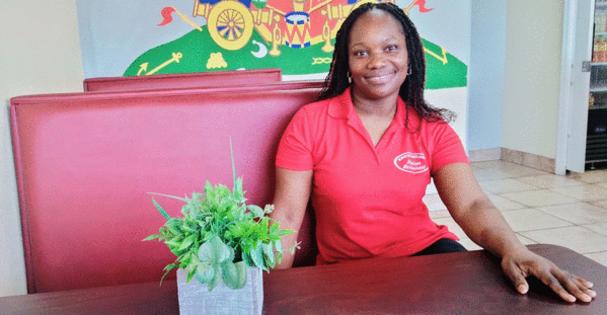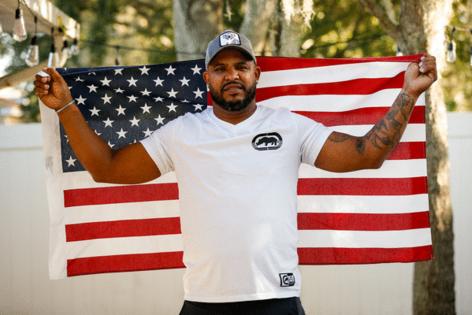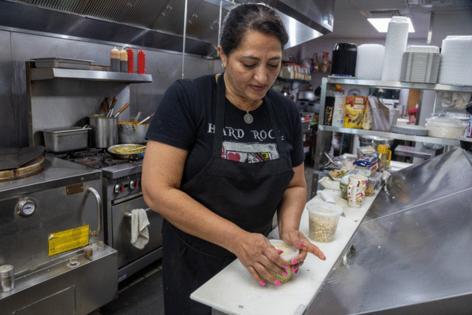$1,000 to leave the US? These immigrants find Trump's offer 'an insult'
Published in News & Features
TAMPA, Fla. — The Trump administration is offering $1,000 to people who choose to leave the country.
As part of Project Homecoming, federal officials took CBP One, an app used during President Joe Biden’s administration to manage the arrival of more than a million immigrants, and turned it into a tool called CBP Home. Now, it helps people start the voluntary self-deportation process.
Any non-U.S. citizen who uses CBP Home will receive travel assistance and $1,000, according to the U.S. Department of Homeland Security. The agency said that immigrants who use CBP Home also will be “deprioritized” for detention and removal by immigration enforcement.
On May 19, the Trump administration sent dozens of immigrants from Honduras and Colombia back to their countries. It was the program’s first voluntary deportation, according to the Associated Press. Aside from the cash, each deportee is afforded “the possibility they could one day return to the United States legally,” according to a Homeland Security statement.
The plan, however, raises more questions than answers: is it a viable option for those with jobs, businesses, American-born kids, or mixed-status families?
Many are skeptical. Others don’t see it as a good idea. Here’s what some Tampa Bay residents think of the offer.
Yusmier Mesa, 42, Tampa
Five years ago, Yusmier Mesa was released by U.S. immigration officials after crossing the southern border with a form known as I-220A. This form lets people apply for a temporary driver’s license and work permit. It does not grant temporary permission to remain in the United States for humanitarian reasons.
Mesa, a Cuban immigrant, owns a trucking company in Tampa. He said the $1,000 offer isn’t something he can consider.
“They’re trying to offer an incentive to people who don’t have any other options,” said Mesa, 42. “Everyone can decide for themselves, but I wouldn’t take it because of my business, and in Cuba life is in danger. I fled out of fear of repression. For me, that’s not an option.”
Mesa has drivers working with him and owns two trucks. He said leaving everything behind does not make sense.
“The idea of taking $1,000 is completely out of the question,” he said. “We’re not asking for food stamps or government help. We just want the chance to work like good people who help their communities, not like prisoners.”
Mesa, a husband and father of one, said he’s achieved much more than what $1,000 represents in the short time he’s been in the country.
“I’ve been carrying the weight of this I-220A for five years, not knowing what will happen to me,” he said. “Do you think $1,000 will fix that or give me peace of mind if I leave? Of course not.”
Hernan Lugo-Galicia, 57, Tampa
Hernan Lugo-Galicia was a journalist in Venezuela who reported on government corruption for the newspaper El Nacional. He came in 2017 after receiving threats from the Venezuelan regime. Since then, he has been pursuing an asylum application, but the government has not given a permanent response to his petition.
Lugo-Galicia, 57, thinks $1,000 is not enough to take seriously, since someone can make more than that by doing any kind of work in a week or two.
Most importantly, he said, those he has spoken with are not interested “because freedom is not something you can buy for $1,000.”
“The vast majority of us can’t return to Venezuela because there is a dictatorship, and going back means the risk of being arrested, detained and being called traitor for living in the United States,” Lugo-Galicia said. “Those of us who are here didn’t come for money but for liberty.”
Lugo-Galicia runs a community news site, but his household income depends on construction and maintenance jobs.
“I do all kinds of work in this country. Because here you have to do a bit of everything. But my situation cannot be solved with a $1,000 offer,” he said.
Lucile Oscar, 42, Brandon
In Brandon, Lucile Oscar, 42, owns a small Haitian restaurant called Kreyol Delight. She’s been in the United States since she was 16.
When Oscar heard about the Trump administration’s $1,000 offer, she couldn’t believe it.
“It’s definitely not a good idea and not even a good deal,” Oscar said. “I don’t like it, and honestly, it even feels like an insult to hardworking people.”
Oscar said many Haitian immigrants came to the United States seeking safety and opportunity for their families.
“We’re not here to mess things up, like the government makes it seem,” she said. “We came here to build a better life.”
Running her business hasn’t been easy, but it’s her source of income to support her family, including five children. The restaurant in Brandon is her second location; she has another in the Busch Gardens area. Oscar said her restaurants are proof that most immigrants are hardworking and have earned far more than what the government is offering.
Oscar is a naturalized citizen, but she has a mixed-status family that doesn’t even want to consider the offer, she said.
“The $1,000 doesn’t come close to addressing the real challenges immigrants face,” said Oscar. “It’s extremely hard to get ahead, we know that. The economy is tough and prices are very high. But we’re here to work and do better than in our countries.”
Sunita Chheda, 53, Riverview
For Sunita Chheda, the offer just doesn’t make sense.
Chheda, 53, owns Saffron Xpress, a small food stand inside a gas station in Riverview, where she serves homemade Indian and Indo-Chinese food. She said the money isn’t going to solve anything.
“You came from a country looking for new opportunities, you brought everything you had with you, and now you’re going to go back with just $1,000?” she said. “No, thank you.”
A naturalized citizen, Chheda and her family have built their lives in the United States over the past 20 years. She said the idea of leaving it all and returning to India is unrealistic.
“There are families who have been in the U.S. for years and are raising children. How is someone supposed to take their kids and start over?” said Chheda. “We have friends and family in all kinds of legal situations, but their lives are rooted here.”
Chheda doesn’t know anyone who considers the offer a real option.
“I don’t think it’s a good idea. At least not for the people I know, the ones I talk to,” she said. “We all left India looking for a better life. Maybe things have changed there, in India, but this is America.”
She said putting a price on life in the United States just feels wrong.
“How can you put a value on our efforts and time with just $1,000? That’s not right,” she said.
Valentina Rodriguez Martin, 46, Tampa
In 2016, Valentina Rodriguez Martin came to the United States from Venezuela seeking political asylum. Eight years later, she’s still waiting for a hearing.
Rodriguez is a wife and mother of two. She lives in Citrus Park and works seven days a week doing deliveries through at least four mobile apps.
Rodriguez Martin, 46, said there is deep emotional and physical stress from living far from her homeland. Still, she believes the self-deportation offer isn’t meant for people like her.
“To me, this $1,000 is a strategy aimed at those who’ve run out of options, people who arrived recently or can’t survive here,” she said. “I see it as a way to make it easier for you to leave the country because they’re basically handing you a plane ticket to go.”
Rodriguez is worried that during these four years, the government will focus only on immigration and not on improving the economy.
“This country has been built, in large part, by immigrants. We move things forward,” said Rodriguez. “Everyone wants to clean up their house, I get it, we all agree on that. But people who are working hard should be supported.”
©2025 Tampa Bay Times. Visit at tampabay.com. Distributed by Tribune Content Agency, LLC.












Comments